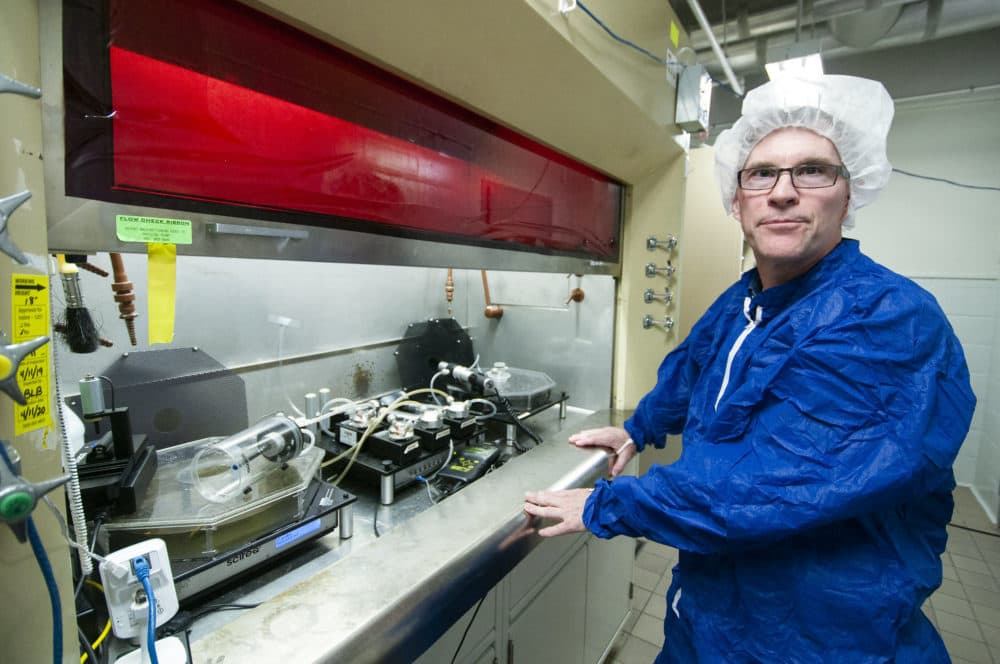Advertisement
Vaping Could Cause Cardiovascular Harm, Researcher Says
Resume
San Francisco city supervisors voted unanimously Tuesday to ban the sale of electronic cigarettes in that city.
The measure still faces a final vote, but it would make San Francisco the first U.S. city to ban e-cigarettes. And it's the latest sign that regulators and researchers are trying to catch up with what former FDA Commissioner Scott Gottlieb has called an epidemic among the nation's youth.
More than 3.6 million middle and high school students used e-cigarettes last year, according to the FDA, an increase of nearly 80% among high schoolers and nearly 50% among middle schoolers over the year before.
Scientists are still learning new things about the possible health impacts of vaping as the FDA struggles to regulate the booming industry, which could be worth more than $40 billion by 2025.
"Personally, I think anybody who sees the uptake of e-cigarettes amongst youth should be concerned about long-term consequences ... because we just don't know what the health risks are," says Dr. Daniel Conklin, a University of Louisville Medical School professor and researcher studying the effects of vaping on the cardiovascular system.
A visit to Conklin's lab requires donning a Tyvek jumpsuit to limit contamination. He and his team of researchers, with funding from the FDA, are using a device that smokes e-cigarettes and analyzes the vapor — as well as its effects on lab mice — to determine what the devices' use does to the human body.

"The FDA is interested in regulating e-cigarettes, but they want to regulate particular constituents that are harmful," Conklin explains. "And so we're trying to figure out what components of the aerosol of e-cigs is contributing to the injury to the heart."
Conklin's lab setup allows researchers to try to mirror real-world e-cigarette use. At the lab, Conklin plugs an e-cigarette into a holder. The end of it lights up blue as pumps whir to life, activating the e-cigarette and pulling air through a series of tubes and small black boxes containing the equipment that will measure what's in the vapor.
"We can control the volume of the puff so it's consistent with ... the puff volume that people would take, and the duration," he says. "But I have to tell you, the real world's very diverse when it comes to electronic cigarettes. Some people just do very light drags on their e-cigs. Others take bigger puffs in order to make vape clouds and do cloud tricks and so on."
The leading e-cigarette company Juul has sponsored its own scientific studies, which it says show secondhand vaping emissions are less toxic than cigarette smoke. Part of what’s difficult about e-cigarette research is how relatively new the products are, and how quickly their use has skyrocketed, Conklin says.
"I think there's some warning signs for heart disease with electronic cigarettes, and these are not just from our animal studies."
Dr. Daniel Conklin
"Five years ago, Blu was the king of the e-cigs. Now it's [Juul]. And the products have changed in size and shape, voltage, some of the constituent flavors have kind of varied," he says. "Some of them you can't even figure out what flavors are present in there — gummy bear, for instance. Tell me what flavors are in there. Juul has raised the roof on the level of nicotine."
Some have argued e-cigarettes could offer people who smoke traditional cigarettes a bridge to quitting smoking altogether. Conklin says while he does not study smoking cessation, the question of whether e-cigarettes could help lower overall smoking rates is an important one to consider. But lingering uncertainty over e-cigarettes' precise health repercussions remains a reason for caution, he says.
"If e-cigarettes outside of traditional pathways can add to that improvement in that number [of people quitting smoking], I say great. In the U.S., from my knowledge of this area, cessation has not been improved by inclusion of e-cigarettes," he says. "And there could be risks switching completely from cigarettes to e-cigarettes, because we don't know the risks of e-cigarettes."
E-cigarette safety is also being taken up in Congress and in states across the country. In April, 11 senators launched a probe of Juul seeking answers about business practices they claim have been shrouded in "immense secrecy." And last month North Carolina filed its own lawsuit against Juul, following a similar investigation from Massachusetts Attorney General Maura Healey last year.
According to Conklin at the University of Louisville, e-cigarettes are far from harmless. Conklin is looking for a link between vaping and cardiovascular diseases like atherosclerosis, when plaque clogs arteries.
"I think there's some warning signs for heart disease with electronic cigarettes, and these are not just from our animal studies," Conklin says. "I'm representing a number of studies done around the world that show that acute exposure to e-cigarettes, including in nonsmoking adults, produces a temporary injury to the blood vessel that's equivalent to that same nonsmoker using a conventional tobacco cigarette. So that's worrisome."
That finding is worrisome for Conklin in part because his own father, a longtime smoker, died of colon cancer at age 46.
"I've been researching mechanisms of tobacco-related heart disease since 1996," he says. "My father's death spurred both my respect for tobacco's addictive potential and its toxicity, which likely contributed to my career in cardiovascular toxicology."
Now that career is focused on a new tobacco product that researchers still know relatively little about.
This article was originally published on June 18, 2019.
This segment aired on June 18, 2019.


